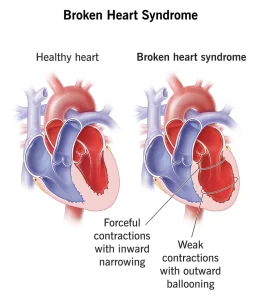Overview
Diagnosis of Broken Heart Syndrome
Broken heart syndrome is often diagnosed in an emergency or hospital setting because its symptoms can mimic a heart attack.
During the examination:
-
Your healthcare professional will ask about symptoms and medical history.
-
You may be asked about recent major stresses, such as the death of a loved one.
-
People with broken heart syndrome usually don’t have prior heart disease symptoms.
Tests to Help Diagnose Broken Heart Syndrome
Blood tests
-
Cardiac enzymes may be elevated in people with broken heart syndrome.
Electrocardiogram (ECG or EKG)
-
Measures the electrical activity of the heart.
-
Sticky patches (electrodes) are placed on the chest, arms, and legs.
-
ECG results for broken heart syndrome look different from a heart attack.
Coronary angiogram
-
Checks for blockages in heart arteries to rule out a heart attack.
-
A catheter is inserted into a blood vessel (usually in the groin or wrist).
-
Dye flows through the catheter to make arteries visible on X-ray.
-
People with broken heart syndrome often have no arterial blockages.
Echocardiogram
-
Uses sound waves to create images of the heart.
-
Shows blood flow, heart valves, and heart shape.
-
Can detect if the heart is enlarged or has unusual shapes due to broken heart syndrome.
Cardiac MRI
-
Uses magnetic fields and radio waves to create detailed images of the heart.
Treatment of Broken Heart Syndrome
There’s no standard treatment specifically for broken heart syndrome. Care is similar to heart attack treatment until diagnosis is clear.
-
Most people stay in the hospital until they recover.
-
Many recover fully within a month.
-
An echocardiogram is usually done 4–6 weeks later to ensure heart function has improved.
-
Recurrences can happen in some cases.
Medications
Once broken heart syndrome is confirmed, medicines may be given to reduce heart strain and prevent further episodes.
-
ACE inhibitors (angiotensin-converting enzyme inhibitors)
-
ARBs (angiotensin 2 receptor blockers)
-
Beta blockers
-
Diuretics (water pills)
-
Blood thinners, if a blood clot is present
Surgeries or Other Procedures
-
Heart attack treatments that open blocked arteries are not helpful in broken heart syndrome.
-
Blocked arteries do not cause broken heart syndrome, so such procedures aren’t required.
Advertisement

